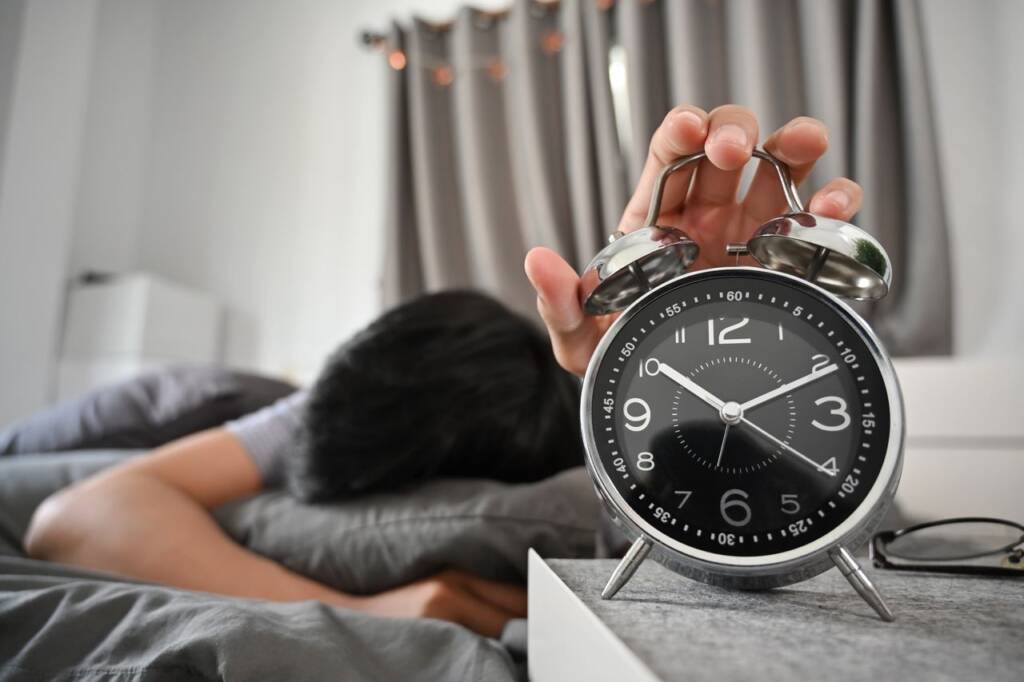Sleep & Mental Health-Is Sleep Really Important?
Sleep is required for proper cognitive and behavioural functions. Lack of sleep can incapacitate the ability to make decisions, concentrate, and process information and cause attention lapses and mood swings. Different age groups need varying hours of sleep per night to maintain a healthy lifestyle. The younger the human, the more sleep requirement is.
The National Sleep Foundation, America recommends the following hours of daily sleep for different age groups.
| Age Group | Recommended Sleep Hours |
| 0-3 Months | 14-17 Hours |
| 4-11 Months | 12-15 Hours |
| 1-2 Years | 11-14 Hours |
| 3-5 Years | 10-13 Hours |
| 6-13 Years | 9-11 Hours |
| 13-17 Years | 8-10 Hours |
| 18-25 Years | 7-9 Hours |
| 16-64 Years | 8-9 Hours |
| 65 Years and older | 7-8 Hours |
Also, lack of sleep has been linked to an increased risk for several medical conditions like obesity, diabetes, heart disease, stroke, poor mental health, and even early death.
Catch Up With Sleep
We all know and have experienced how sleep affects our mood. We feel mentally tired, our situational awareness gets poor and we become irritable. Probably the idiom ‘woke up on the wrong side of the bed’ came into existence because of these behavioural aspects. But this is all fun and games until sleep deprivation becomes a regular part of your life.
Sleep affects our mental and emotional health and thus is related to severe conditions like depression, anxiety etc. Sleep and mental health share a reciprocal relationship. Mental disorders make it difficult for a person to sleep well and lack of sleep worsens the condition. The situation can be another way around too. A proper sleep schedule helps keep mental illnesses at bay and can help one during the recovery process.
Both sleep and mental health are complex issues affected by a multitude of factors, but given their close association, it is plausible to believe that maintaining sleep hygiene has a positive impact on mental health and can be a component of recovery from psychiatric illnesses.
Is Sleep Really Important?
Sleep is required for proper cognitive and behavioural functions. Lack of sleep can incapacitate the ability to make decisions, concentrate, and process information and cause attention lapses and mood swings. Different age groups need varying hours of sleep per night to maintain a healthy lifestyle. The younger the human, the more is the sleep requirement.
The National Sleep Foundation, America recommends the following hours of daily sleep for different age groups.
| Age Group | Recommended Sleep Hours |
| 0-3 Months | 14-17 Hours |
| 4-11 Months | 12-15 Hours |
| 1-2 Years | 11-14 Hours |
| 3-5 Years | 10-13 Hours |
| 6-13 Years | 9-11 Hours |
| 13-17 Years | 8-10 Hours |
| 18-25 Years | 7-9 Hours |
| 16-64 Years | 8-9 Hours |
| 65 Years and older | 7-8 Hours |
Also, lack of sleep has been linked to an increased risk for several medical conditions like obesity, diabetes, heart disease, stroke, poor mental health, and even early death.
Catch Up With Sleep
We all know and have experienced how sleep affects our mood. We feel mentally tired, our situational awareness gets poor and we become irritable. Probably the idiom ‘woke up on the wrong side of the bed’ came into existence because of these behavioural aspects. But this is all fun and games until sleep deprivation becomes a regular part of your life.
Sleep affects our mental and emotional health and thus is related to severe conditions like depression, anxiety etc. Sleep and mental health share a reciprocal relationship. Mental disorders make it difficult for a person to sleep well and lack of sleep worsens the condition. The situation can be another way around too. A proper sleep schedule helps keep mental illnesses at bay and can help one during the recovery process.
Both sleep and mental health are complex issues affected by a multitude of factors, but given their close association, it is plausible to believe that maintaining sleep hygiene has a positive impact on mental health and can be a component of recovery from psychiatric illnesses.
Is Sleep Really Important?
Sleep is required for proper cognitive and behavioural functions. Lack of sleep can incapacitate the ability to make decisions, concentrate, and process information and cause attention lapses and mood swings. Different age groups need varying hours of sleep per night to maintain a healthy lifestyle. The younger the human, the more sleep requirement is.
The National Sleep Foundation, America recommends the following hours of daily sleep for different age groups.
| Age Group | Recommended Sleep Hours |
| 0-3 Months | 14-17 Hours |
| 4-11 Months | 12-15 Hours |
| 1-2 Years | 11-14 Hours |
| 3-5 Years | 10-13 Hours |
| 6-13 Years | 9-11 Hours |
| 13-17 Years | 8-10 Hours |
| 18-25 Years | 7-9 Hours |
| 16-64 Years | 8-9 Hours |
| 65 Years and older | 7-8 Hours |
Also, lack of sleep has been linked to an increased risk for several medical conditions like obesity, diabetes, heart disease, stroke, poor mental health, and even early death.
Catch Up With Sleep
We all know and have experienced how sleep affects our mood. We feel mentally tired, our situational awareness gets poor and we become irritable. Probably the idiom ‘woke up on the wrong side of the bed’ came into existence because of these behavioral aspects. But this is all fun and games until sleep deprivation becomes a regular part of your life.
Sleep affects our mental and emotional health and thus is related to severe conditions like depression, anxiety etc. Sleep and mental health share a reciprocal relationship. Mental disorders make it difficult for a person to sleep well and lack of sleep worsens the condition. The situation can be another way around too. A proper sleep schedule helps keep mental illnesses at bay and can help one during the recovery process.
Both sleep and mental health are complex issues affected by a multitude of factors, but given their close association, it is plausible to believe that maintaining sleep hygiene has a positive impact on mental health and can be a component of recovery from psychiatric illnesses.
Steps to Maintain Sleep Hygiene
1. Increase Your Exposure To Daylight
Regular exposure to sunlight helps our body maintain an efficient 24-hour timer of its own called the circadian rhythm. It affects the brain, body and hormones, maintaining a timely schedule for when to wake up and when it’s time to sleep.
Bright light keeps the circadian rhythm healthy by improving daytime energy and affirming quality sleep at night.
2. Limit Screen Exposure After Sunset
This again has to do with the circadian rhythm. Electronic screens emit a special blue light that tricks the brain into thinking that it’s still daytime. Wearing glasses or installing blue lens filters for the devices is one way to tackle the situation but it is best to avoid viewing screens at least an hour before bedtime.
3. Control The Urge To Take Naps During The Day
Taking short 15-20 minutes naps during the day is considered beneficial for the body and mind. However, naps longer than that during the day interfere with your night’s sleep. It may confuse your internal clock, making you struggle to sleep at night.
4. Create The Atmosphere
Bedroom atmosphere is a key factor in one’s sleep quality. The room temperature, position and placement of items, overall arrangements and external light and noise make up the whole mood.
Optimising the environment where you sleep can have astonishing results. Minimise external disturbances and artificial lights from electronic devices. Try to keep the room temperature pleasant. Make sure your mattress and pillow are personally comfortable. And remember to always dust your bed before sleeping.
5. Increase Your Melatonin Consumption
Melatonin is a sleep-inducing hormone produced in the body as it starts to get dark. However, the current lifestyle interrupts its production cycle. Consumption of melatonin-rich foods like tart cherry, nuts, banana, oats, ginger, etc. for at least 2 hours before bedtime can help you sleep better.
6. Avoid caffeine and alcohol late in the evening
What we eat and when we eat have a direct effect on our bodies. Caffeine blocks the receptors that bind with the sleep-inducing protein. It stimulates the nervous system making it difficult for you to get sleep when you want to.
Alcohol hampers the sleep hormone production in your body and is a proven cause of symptoms of sleep apnea and disrupted sleep patterns. On a larger scale, It instigates night-time melatonin production thus messing up the body’s circadian rhythm.
Sleepy Heads
We have well established that sleep is good for us and renders us healthy. But as the old saying goes, excess of nothing is good. So how much sleep is too much sleep? The chart above shows the varying hours of sleep suitable for people of different ages but that’s not it. Your activity level, lifestyle and general health also determine how much you should sleep. There are a number of sleep disorders like hypersomnia, insomnia, narcolepsy etc. that can cause serious health issues. Read this blog to know more about sleep disorders, their side effects and remedies.
While sleeplessness is more closely associated with mental illnesses than oversleeping, the latter is also an alarming sign. Long sleep or Hypersomnia has been observed to worsen psychiatric conditions of people. A person may sleep extra because they lack the motivation to face the day and further feel they’ve missed out on life when they wake up. This functions the opposite way around too. When a person feels low they resort to sleeping more as an escape from reality and so the negative cycle continues.

Tips To Avoid Oversleeping
1. Set A Consistent Schedule
We all are guilty of hitting the snooze button when our alarm rings in the morning. Most of us set multiple alarms to wake ourselves up. What we don’t realise is that by doing so we are preparing our brain to be lazy and suggesting it’s acceptable. We must unlearn that. According to the 21/90 day rule by Dr Maxwell Maltz, it takes 21 days to make a habit and 90 days to make a permanent lifestyle change. Try to fix a morning wake-up time and stay true to it for the next 3 weeks i.e. 21 days. Similarly, set a bedtime and stick to it. This will anchor the circadian rhythm of your body and avoid sleep loss and sleep debt.
2. Streamline Your Day
“Tired minds don’t plan well. Sleep first, plan later.” – Walter Reisch
When we have a packed day our sleep is involuntarily put at stake. Tight deadlines and the highly regressive yet popular workaholic culture have further undermined our need for timely sleep. It is advisable to chalk out an agenda for the day ahead eliminating the unnecessary. Allow yourself some free time before bed to sleep at the set time. This will help you have a more organised life and keep your mind free of avoidable issues hence, allow you to get sleep more easily. You will have higher motivation to get up on time and do the tasks you pre-decided. Completing the tasks and sleeping on time creates a positive feedback loop for a person.
3. Have a Bedtime Ritual
A relaxation routine before bedtime can help you disconnect from your previous day and its experiences that may occupy your mind making it difficult to sleep. Meditation, reading a book, listening to soothing music, or taking a bath can be very relieving in this case. Getting quality sleep will lead to a healthier lifestyle pattern.
Making The Nights Good
Sleep is the bridge that connects our mental health to our body. It has been given by nature to do the critical healing work helping us keep the world in perspective and refocus on the essence of who we are. It’s important to have a healthy sleep pattern for a healthy mind.
If self-help doesn’t work, you may consult a doctor. Maintain a sleep diary for about 2 weeks before visiting a doctor for them to understand your case better. The diagnosis involves studying your medical history to look for any underlying psychological reason. Based on the results, the doctor will suggest treatment. If your issue persists, you may consult a sleep disorder specialist.


